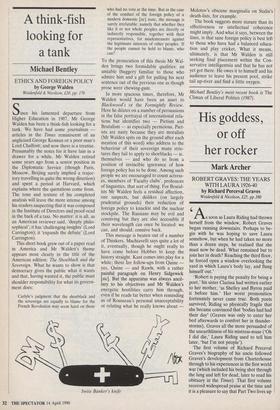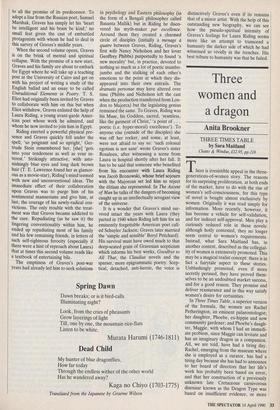His goddess, or off her rocker
Mark Archer
ROBERT GRAVES: THE YEARS WITH LAURA 1926-40 by Richard Perceval Graves
Weidenfeld & Nicolson, £25, pp.380
As soon as Laura Riding had thrown herself from the window, Robert Graves began running downstairs. Perhaps to be- gin with he was hoping to save Laura somehow, but when he had taken no more than a dozen steps, he realised that she must now be dead. What remained but to join her in death? Reaching the third floor, he forced open a window overlooking the yard in which Laura's body lay, and flung himself out.'
`Robert is paying the penalty for being a poet,' his sister Clarissa had written earlier to her mother, 'as Shelley and Byron paid it before him.' Her worst premonition fortunately never came true. Both poets survived, Riding so physically fragile that she became convinced that 'bodies had had their day' (Graves was only to enter her bed afterwards to comfort her in thunder- storms), Graves all the more persuaded of the unearthliness of his mistress-muse ('Oh I did die,' Laura Riding used to tell him later, 'but I'm not people').
The first volume of Richard Perceval Graves's biography of his uncle followed Graves's development from Charterhouse through to his experiences in the first world war (which included his being shot through the lung and left for dead, later to read his obituary in the Times). That first volume received widespread praise at the time and it is a pleasure to say that Part Two lives up to all the promise of its predecessor. To adopt a line from the Russian poet, Samuel Marshak, Graves has simply let his 'heart be intelligent and his brain be kind,' no small feat given the cast of embattled protagonists with whom he had to deal in this survey of Graves's middle years.
When the second volume opens, Graves is on the brink of mental and spiritual collapse. With the promise of a new start, Graves and his family are about to embark for Egypt where he will take up a teaching post at the University of Cairo and get on with his project of writing a study of the English ballad and an essay to be called Untraditional Elements in Poetry. T. S. Eliot had originally been invited by Graves to collaborate with him on this but when Eliot withdrew, Graves enlisted the help of Laura Riding, a young avant-garde Amer- ican poet whose work he admired, and whom he now invited to join him in Egypt.
Riding exerted a powerful physical pre- sence and Graves quickly fell under the spell, 'so poignant and so upright,' Ger- trude Stein remembered her, [she] 'gets into your tenderness as well as your in- terest.' Strikingly attractive, with asto- nishingly blue eyes and long dark brown hair (T. E. Lawrence found her as glamor- ous as a movie-star), Riding's mind teemed with new and unconventional ideas. The immediate effect of their collaboration upon Graves was to purge him of his sentimental mannerisms and give him, at last, the courage of his newly-radical con- victions. The only trouble with the treat- ment was that Graves became addicted to the cure. Repudiating (as he saw it) the lingering conventionality within him, he ended up repudiating most of his family and his few remaining friends, in letters of such self-righteous ferocity (especially if there were a hint of reproach about Laura) that at times this second volume reads like a textbook of entertaining bile.
The emptiness of Graves's post-war Years had already led him to seek solutions in psychology and Eastern philosophy (in the form of a Bengali philosopher called Basanta Mallik) but in Riding he disco- vered his myth-maker par excellence. Around them they created a charmed circle of disciples (initially a menage a quatre between Graves, Riding, Graves's first wife Nancy Nicholson and her lover Geoffrey Phibbs) purportedly to found 'a new morality' but, in practice, devoted to nothing so much as a lot of poetic mumbo- jumbo and the stalking of each other's emotions to the point at which they dis- appeared into their own entrails. The dramatis personae may have altered over time (Phibbs and Nicholson left the cast when the production transferred from Lon- don to Majorca) but the legislating genius remained the same. To Graves, Riding was his Muse, his Goddess, sacred, 'seamless, like the garment of Christ,' a point of . . . poetic (i.e. hyper-moral) excellence'). To anyone else (outside of the disciples) she was off her rocker, and some, at least, were not afraid to say so: 'such colossal egotism is not sane' wrote Graves's sister Rosaleen, after witnessing a scene from Laura in hospital shortly after her fall. It has to be said that someone who benefited from his encounter with Laura Riding was Jacob Bronowski, whose brief sojourn with the Majorcan set led him to reject the elitism she represented. In The Ascent of Man he talks of the dangers of becoming caught up in an intellectually arrogant view of the universe.
It is a wonder that Graves's mind sur- vived intact the years with Laura (they parted in 1940 when Riding left him for an eminently forgettable American poet call- ed Schuyler Jackson; Graves later married the 'simple and sensible' Beryl Pritchard). His survival must have owed much to that deep-seated grain of Gravesian scepticism which informs his best works, Goodbye to All That, the Claudius novels and the sparser, more epigrammatic poetry. Scep- tical, detached, anti-heroic, the voice is distinctively Graves's even if its remains that of a minor artist. With the help of this outstanding new biography, we can see how the pseudo-spiritual intensity of Graves's feelings for Laura Riding seems more like an attempt to transcend a humanity the darker side of which he had witnessed so vividly in the trenches. His best tribute to humanity was that he failed.



















































 Previous page
Previous page